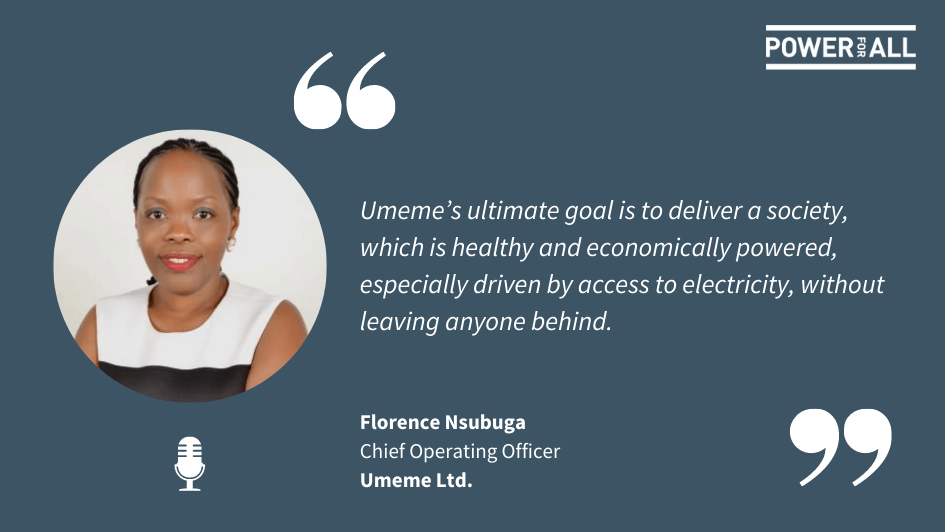In this episode of the Power for All podcast, Kristina Skierka, Founder and CEO of Power for All speaks with Florence Nsubuga, Chief Operating Officer of Umeme Ltd., Uganda’s largest distribution utility. Florence is also a team leader of the project Girls for Girls, a forum that empowers women between the ages of 15 and 35 years to become leaders in their own communities. The conversation aims to highlight the work of Umeme along with the opportunity of working together to end energy poverty and achieve universal energy access by 2030.
The discussion sheds more light on the launch of the first integrated energy pilot dubbed Twaake in Uganda and Utilities 2.0 globally. The Utilities 2.0 is a global initiative started by Power for All; the Twaake pilot includes a group of implementing partners in addition to Umeme: East African Power, EnerGrow, Equatorial Power, Makerere University and the Rockefeller Foundation. Umeme was established in 2005 and is the only cross-listed electricity distributor in Uganda and Nairobi stock exchanges. It is responsible for 95% of the grid footprint in Uganda, with a mandate to expand electricity access and maintain the distribution network. Despite these efforts,access to electricity in the country stands at 24% as of 2019.
Utilities 2.0
Against the backdrop of the Government of Uganda’s energy goals of achieving 60% energy access and raising new annual connections from 70,000 to 300,000, Umeme collaborated with Power For All and The Rockefeller Foundation on Utilities 2.0 Initiative. The idea was to identify the synergies from centralized utilities and decentralized players and test their impact on accessing power faster and at cheaper rates. The objectives of the project were to focus on demand stimulation, impact testing of the technology integration on electricity loss reduction and supply reliability, which are some of the pertinent areas in terms of serving customers.
Along with assistance from the government, Twaake project aims to impact Uganda’s agriculture value chain. Various players have also committed to growing industrial demand. The Ministry of Energy in partnership with GIZ has begun campaigns to shift energy consumption at the household level to cheaper and cleaner options. Additionally, the financial assistance for productive use of decentralised grid energy supply is a breakthrough aspect of Utilities 2.0
In terms of creating awareness and building partnerships, webinars are held periodically with other Utility companies as well as participation in events such as Africa Utility Week. A number of publications are being produced under the project with the support of various universities, including University of Massachusetts Amherst, Duke and Makerere Universities.. This will go a long way in sharing information with other utility partners.
Technology and Training
Investments in online payment services, and setting up technology for employees to work from home has enabled better services to customers even during the Covid-19 pandemic. Technologies such as SCADA, which communicates with medium voltage networks, enables Umeme to operate its networks remotely. Moreover, investment in prepaid meters has helped customers to make payments through Umeme’s partner banks and telecom companies via their mobile phones. This has helped Umeme to comply with Covid-19 lockdown rules of the government while also being able to provide premium services to the customers.
Umeme has also invested in training and recruiting a pool of engineers and technicians so that there is a growth in the pipeline of talent and they can continue to feed this pipeline over the years. Along with incentives and training for managers who have been with the company for a while, graduate trainees are incentivized to stay in the company for long. The younger generation is encouraged to innovate and try new things. New ideas are given attention and an environment where those ideas can be turned into projects.
Women in Umeme
Umeme is working specifically to create employment opportunities for women in the company, opening up all its job roles for women as well. Despite this, the numbers in executive roles are low. On boards, on an average, only 20% are women and for the executive position, around 30% are women. The problem, Florence identifies, starts very early on in a girl’s life. To change this, the programme Girls for Girls was co-founded by her. The Girls for Girls pilot launched in Uganda, started with a school called Bukanga with 80 girls. The girls are mentored through skill-building exercises and guided through issues around courage , leadership, purpose, and development of soft skills. The goal is to increase visibility of these girls and push them towards becoming not just competent but also self- reliant in applying and managing challenging jobs.
Utilities of the Future
Over 50% of the population in Africa is below 25 years of age. Innovation and investment in technology is very critical for reforms that Uganda as a country can undertake. Umeme strives to continue to work with key stakeholders, including the government in order to achieve the country’s aspirations and the vision of achieving 100% energy access by 2040. The ultimate goal is to deliver a healthy and economically powered society driven by access to electricity, without leaving anyone behind.
